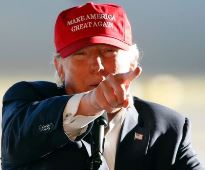|
The Rhetorical Trap: North Korea as “State Sponsor of Terrorism”
by Binoy Kampmark via jaxie - Counterpunch Wednesday, Nov 29 2017, 10:16am
international /
prose /
post
Western Media's Aversion to Evidence
Are such designations ever useful? At the stroke of a pen, an entire state is designated “terrorist” or a seemingly milder sponsor of terrorism, its name finding a way onto a list of supposed unmentionables and moral inverts. Obscure groups and more notable countries huddle together, supposedly sharing some disreputable common ground and we are none the wiser on the content behind the categorisation.

Full of unsubstantiated accusations and shit
Terrorist designations are also highly problematic when they issue from powers with the capacity to strike, globally, within minutes, under orders from a creakily wacky leadership that threatens other states with fire and brimstone immolation should the circumstances arise.
Such circumstances of apocalyptic annihilation have even prompted members of the US Congress to hold hearings on the scope of presidential authority to launch nuclear weapons, fearing that man in the White House.
That the state being threatened is a blemished North Korea does not matter to a certain US President, Donald J. Trump, who made room in his schedule last week to deem the DPRK a sponsor of terrorism. Having been taken off in 2008 from the US watch list, Pyongyang now finds itself mixing it with other unmentionables.
The guns have been brought out in the US press adding succour to the decision. “North Korea,” claims Kim Hyon-hui without equivocation, “has always been a terrorist nation.” Her credentials to fame might well suit her in making the observation. She, after all, was a former North Korean agent behind the bombing of a South Korean airliner in 1987, resulting in the deaths of all 115 on board.
Testimony, and moral judgments from spies, are tenuous things. Can one ever accept the record of a person trained to lie? But such views are being given the credence born from propagandistic timing. Much of this might be atonement on her part, the stirrings of guilt at having been a regime’s witting instrument. “It was, from my view, a major mistake (on the part of the US) to [take the country off the list] without receiving a formal apology from the North Korean regime for the bombing.”
The portrait painted of the regime is one that involves hiring well trained killers who roam the globe to do the leadership’s grand bidding. “In the case of the KAL bombing and other previous operations, well-trained North Korean agents carried out terrorist attacks themselves, and if caught, they committed suicide so as not to reveal North Korea had orchestrated them.” Obviously, she proved to be an exception.
The labelling strategy here is part of the staple of diplomatic isolation. It enables the Trump administration to further drive its program of sanctions, though Secretary of State Rex Tillerson acknowledged that, “The practical effects may be limited but hopefully we’re closing off a few loopholes with this.”
Tillerson may well be ignoring a few fundamental and very impractical effects. Using such tactics of labelling creates a double bind. It condemns the subject in question – in this case, North Korea – to an inflexible moral caste, while also boxing in the labelling power – here, the United States. Avenues of dialogue are cut off, while other powers, such as China, are discouraged to press for a solution.
This form of self-inflicted rhetorical ambush has historical precedent. The Union insisted on unconditional surrender from the Confederate states during the US Civil War. This rhetoric of unconditional surrender would again make its morally high minded appearance during the Second World War towards both Germany and Japan, a purposely taken stance that subsequently restricted any flexible diplomatic approach towards the Axis Powers.
“First articulated by President Roosevelt at the Casablanca Conference in 1943,” writes James W. Hikins, “the slogan metamorphosized [sic] by 1945 into a political shibboleth which operated to constrain policy makers.”
The stance towards Japan, in particular, arguably lengthened the duration of the conflict, given fears on the part of Japanese officials that they would have to do away with the Mikado in any settlement with the US and its allies. The momentum towards using the atomic bomb on Hiroshima and Nagasaki was further assured despite the contention that the country was on its knees.
“By August, 1945,” Hikins explains, “the doctrine’s calcifying effect on American decision-making precluded an earlier end to hostilities in the Pacific and resulted in atomic devastation for the two Japanese cities.”
There is little to doubt the cruel and desperate credentials of the DPRK regime. Abductions have taken place, assassinations and provocations carried out. But such labels as “state sponsor of terrorism” are intended to isolate and distance such states when the impetus in resolving a crisis should involve bringing them in from the cold.
This dubious title will hardly stop any scheduled missile tests, nor will it dissuade the regime from pursuing a task of proofing itself against efforts to carry out regime change. It also makes public relations, once negotiations are required to take place, a near impossible sell.
Copyright applies.
https://www.counterpunch.org/2017/11/29/the-rhetorical-trap-north-korea-as-state-sponsor-of-terrorism/
<< back to stories
|